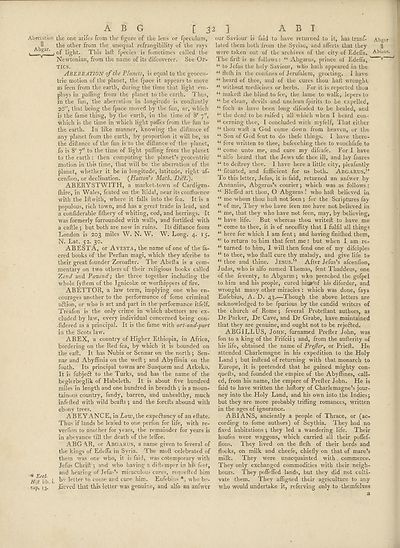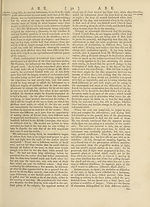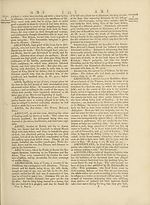Encyclopaedia Britannica, or, a Dictionary of arts, sciences, and miscellaneous literature : enlarged and improved. Illustrated with nearly six hundred engravings > Volume 1, A-AME
(50) Page 32 - ABG
Download files
Complete book:
Individual page:
Thumbnail gallery: Grid view | List view

A B G [3
Aberration the one arifes from the figure of the lens or fpeculum,
II the other from the unequal refrangibility of the rays
. ‘ , of light. This laft fpecies is fometimes called the
Newtonian, from the name of its difcoverer. See Op¬
tics.
ABERRATION of the Planets, is equal to the geocen¬
tric motion of the planet, the fpace it appears to move
as feen from the earth, during the time that light em¬
ploys in paffing from the planet to the earth. Thus,
in the fun, the aberration in longitude is confiantly
26'', that being the fpace moved by the fun, or, which
is the fame thing, by the earth, in the time of 8' 7",
which is the time in which light paffes from the fun to
the earth. In like manner, knowing the dillance of
any planet from the earth, by proportion it will be, as
the diflance of the fun is to the diftance of the planet,
fo is 8' 7" to the time of light paffing from the planet
to the earth : then computing the planet’s geocentric
motion in this time, that will be the aberration of the
planet, whether it be in longitude, latitude, right af-
cenfion, or declination. (Hutton's Math. DifH).
ABERYSTWITH, a market-town of Cardigan-
fhire, in Wales, feated on the Ridal, near its confluence
with the lit with, where it falls into the fea. It is a
populous, rich town, and has a great trade in lead, and
a confiderable filhery of whiting, cod, and herrings. It
was formerly furrounded with walls, and fortified with
a caflle j but both are now in ruins. Its diftance from
London is 203 miles W. N. W. W. Long. 4. 15.
N. Lat. 52. 30.
ABESTA, or Avesta, the name of one of the fa-
cred books of the Perlian magi, which they afcribe to
their great founder Zoroafter. The Abefta is a com¬
mentary on twm others of their religious books called
Zend and Pazcnd; the three together including the
whole fyftem of the Ignicolse or worftiippers of fire.
ABETTOR, a law term, implying one who en¬
courages another to the performance of fome criminal
action, or who is art and part in the performance itfelf.
Treafon is the only crime in which abettors are ex¬
cluded by lawq every individual concerned being con-
•fidered as a principal. It is the fame with art-and-part
in the Scots law\
ABEX, a country of Higher Ethiopia, in Africa,
bordering on the Red fea, by which it is bounded on
the eaft. It has Nubia or Sennar on the north ; Sen-
nar and Abyflinia on the weft \ and Abyflinia on the
fouth. Its principal towns are Suaquem and Arkeko.
It is fubjeft to the Turks, and has the name of the
beglerbeglik of Habeleth. It is about five hundred
miles in length and one hundred in breadth ; is a moun¬
tainous country, fandy, barren, and unhealthy, much
infefted with wild beafts j and the forefts abound with
ebony trees.
ABEYANCE, in Law, the expectancy of an eftate.
Th us if lands be leafed to one perfon for life, with re-
verfion to another for years, the remainder for years is
in abeyance till the death of the lelfee.
ABG A.R, or A.BGARUS, a name given to feveral of
the kings of Edelfa in Syria. The moft celebrated of
them was one who, it is faid, was cotemporary with
Jefus Chrift •, and who having a diftemper in his feet,
# ^ ^ and hearing of Jefus’s miraculous cures, requefted him
Hiji lib i. Ietter t0 <-'orae and cure him. Eufebius *, who be-
cap. 13. lieved that this letter was genuine, and alfo an anfwer
s ] A B I
our Saviour is faid to have returned to it, has tranf- Abgar
lated them both from the Syriac, and alferts that they jj
were taken out of the archives of the city of Edefla. Abians.
The firft is as follows : “ Abgarus, prince of Edefla,
“ to Jefus the holy Saviour, who hath appeared in the
“ fleftr in the confines of Jerufalem, greeting. I have
“ heard of thee, and of the cures thou haft wrought
“ without medicines or herbs. For it is reported thou
“ makeft the blind to fee, the lame to walk, lepers to
“ be clean, devils and unclean fpirits to be expelled,
“ luch as have been long difeafed to be healed, and
“ the dead to be raifed •, all which when I heard con-
“ cerning thee, I concluded with myfelf, That either
“ thou waft a God come down from heaven, or the
“ Son of God fent to do thefe things. I have there-
“ fore written to thee, befeeching thee to vouchfafe to
“ come unto me, and cure my difeafe. For I have
“ alfo heard that the Jews ufe thee ill, and lay fnares
“ to deftroy thee. I have here a little city, pleafantly
“ fituated, and fufficient for us both. Abcarus.”
To this letter, Jefus, it is faid, returned an anfwer by
Annanias, Abgarus’s courier j which was as follows :
“ Blefled art thou, O Abgarus ! who haft believed in
“ me whom thou haft not feen $ for the Scriptures fay
“ of me, They who have feen me have not believed in
“ me, that they who have not feen, may, by believing,
“ have life. But whereas thou writeft to have me
“ come to thee, it is of neceflity that I fulfil all things
“ here for which I am fent; and having finiftred them,
“ to return to him that fent me : but when I am re-
“ turned to him, I will then fend one of my difciples
“ to thee, who ftiall cure thy malady, and give life to
“ thee and thine. Jesus.” After Jefus’s afcenfion,
Judas, who is alfo named Thomas, fent Thaddeus, one
of the feventy, to Abgarus •, wko preached the gofpel
to him and his people, cured him of his diforder, and
wrought many other miracles : which was done, fays
Eufebius, A. D. 43.—Though the above letters are
acknowledged to be fpurious by the candid writers of
the church of Rome j feveral Proteftant authors, as
Dr Parker, Dr Cave, and Dr Grabe, have maintained
that they are genuine, and ought not to be rejedled.
ABGILLUS, John, furnamed Prefter John, was
fon to a king of the Frifcii} and, from the aufterity of
his life, obtained the name of Prefer, or Prieft. He
attended Charlemagne in his expedition to the Holy
Land 5 but inftead of returning with that monarch to
Europe, it is pretended that he gained mighty con-
quefts, and founded the empire of the Abylfines, call¬
ed, from his name, the empire of Prefter John. He is
faid to have written the hiftory of Charlemagne’s jour¬
ney into the Holy Land, and his own into the Indiesj
but they are more probably trifling romances, written
in the ages of ignorance.
ABIANS, anciently a people of Thrace, or (ac¬
cording to fome authors) of Scythia. They had no
fixed habitations ; they led a wandering life. Their
houfes were waggons, which carried all their polfef-
fions. They lived on the flelh of their herds and
flocks, on milk and cheefe, chiefly on that of mare’s
milk. They were unacquainted with commerce.
They only exchanged commodities with their neigh¬
bours. They poffeffed lands, but they did not culti¬
vate them. They afligned their agriculture to any
who would undertake it, referving only to themfelv.es
a
Aberration the one arifes from the figure of the lens or fpeculum,
II the other from the unequal refrangibility of the rays
. ‘ , of light. This laft fpecies is fometimes called the
Newtonian, from the name of its difcoverer. See Op¬
tics.
ABERRATION of the Planets, is equal to the geocen¬
tric motion of the planet, the fpace it appears to move
as feen from the earth, during the time that light em¬
ploys in paffing from the planet to the earth. Thus,
in the fun, the aberration in longitude is confiantly
26'', that being the fpace moved by the fun, or, which
is the fame thing, by the earth, in the time of 8' 7",
which is the time in which light paffes from the fun to
the earth. In like manner, knowing the dillance of
any planet from the earth, by proportion it will be, as
the diflance of the fun is to the diftance of the planet,
fo is 8' 7" to the time of light paffing from the planet
to the earth : then computing the planet’s geocentric
motion in this time, that will be the aberration of the
planet, whether it be in longitude, latitude, right af-
cenfion, or declination. (Hutton's Math. DifH).
ABERYSTWITH, a market-town of Cardigan-
fhire, in Wales, feated on the Ridal, near its confluence
with the lit with, where it falls into the fea. It is a
populous, rich town, and has a great trade in lead, and
a confiderable filhery of whiting, cod, and herrings. It
was formerly furrounded with walls, and fortified with
a caflle j but both are now in ruins. Its diftance from
London is 203 miles W. N. W. W. Long. 4. 15.
N. Lat. 52. 30.
ABESTA, or Avesta, the name of one of the fa-
cred books of the Perlian magi, which they afcribe to
their great founder Zoroafter. The Abefta is a com¬
mentary on twm others of their religious books called
Zend and Pazcnd; the three together including the
whole fyftem of the Ignicolse or worftiippers of fire.
ABETTOR, a law term, implying one who en¬
courages another to the performance of fome criminal
action, or who is art and part in the performance itfelf.
Treafon is the only crime in which abettors are ex¬
cluded by lawq every individual concerned being con-
•fidered as a principal. It is the fame with art-and-part
in the Scots law\
ABEX, a country of Higher Ethiopia, in Africa,
bordering on the Red fea, by which it is bounded on
the eaft. It has Nubia or Sennar on the north ; Sen-
nar and Abyflinia on the weft \ and Abyflinia on the
fouth. Its principal towns are Suaquem and Arkeko.
It is fubjeft to the Turks, and has the name of the
beglerbeglik of Habeleth. It is about five hundred
miles in length and one hundred in breadth ; is a moun¬
tainous country, fandy, barren, and unhealthy, much
infefted with wild beafts j and the forefts abound with
ebony trees.
ABEYANCE, in Law, the expectancy of an eftate.
Th us if lands be leafed to one perfon for life, with re-
verfion to another for years, the remainder for years is
in abeyance till the death of the lelfee.
ABG A.R, or A.BGARUS, a name given to feveral of
the kings of Edelfa in Syria. The moft celebrated of
them was one who, it is faid, was cotemporary with
Jefus Chrift •, and who having a diftemper in his feet,
# ^ ^ and hearing of Jefus’s miraculous cures, requefted him
Hiji lib i. Ietter t0 <-'orae and cure him. Eufebius *, who be-
cap. 13. lieved that this letter was genuine, and alfo an anfwer
s ] A B I
our Saviour is faid to have returned to it, has tranf- Abgar
lated them both from the Syriac, and alferts that they jj
were taken out of the archives of the city of Edefla. Abians.
The firft is as follows : “ Abgarus, prince of Edefla,
“ to Jefus the holy Saviour, who hath appeared in the
“ fleftr in the confines of Jerufalem, greeting. I have
“ heard of thee, and of the cures thou haft wrought
“ without medicines or herbs. For it is reported thou
“ makeft the blind to fee, the lame to walk, lepers to
“ be clean, devils and unclean fpirits to be expelled,
“ luch as have been long difeafed to be healed, and
“ the dead to be raifed •, all which when I heard con-
“ cerning thee, I concluded with myfelf, That either
“ thou waft a God come down from heaven, or the
“ Son of God fent to do thefe things. I have there-
“ fore written to thee, befeeching thee to vouchfafe to
“ come unto me, and cure my difeafe. For I have
“ alfo heard that the Jews ufe thee ill, and lay fnares
“ to deftroy thee. I have here a little city, pleafantly
“ fituated, and fufficient for us both. Abcarus.”
To this letter, Jefus, it is faid, returned an anfwer by
Annanias, Abgarus’s courier j which was as follows :
“ Blefled art thou, O Abgarus ! who haft believed in
“ me whom thou haft not feen $ for the Scriptures fay
“ of me, They who have feen me have not believed in
“ me, that they who have not feen, may, by believing,
“ have life. But whereas thou writeft to have me
“ come to thee, it is of neceflity that I fulfil all things
“ here for which I am fent; and having finiftred them,
“ to return to him that fent me : but when I am re-
“ turned to him, I will then fend one of my difciples
“ to thee, who ftiall cure thy malady, and give life to
“ thee and thine. Jesus.” After Jefus’s afcenfion,
Judas, who is alfo named Thomas, fent Thaddeus, one
of the feventy, to Abgarus •, wko preached the gofpel
to him and his people, cured him of his diforder, and
wrought many other miracles : which was done, fays
Eufebius, A. D. 43.—Though the above letters are
acknowledged to be fpurious by the candid writers of
the church of Rome j feveral Proteftant authors, as
Dr Parker, Dr Cave, and Dr Grabe, have maintained
that they are genuine, and ought not to be rejedled.
ABGILLUS, John, furnamed Prefter John, was
fon to a king of the Frifcii} and, from the aufterity of
his life, obtained the name of Prefer, or Prieft. He
attended Charlemagne in his expedition to the Holy
Land 5 but inftead of returning with that monarch to
Europe, it is pretended that he gained mighty con-
quefts, and founded the empire of the Abylfines, call¬
ed, from his name, the empire of Prefter John. He is
faid to have written the hiftory of Charlemagne’s jour¬
ney into the Holy Land, and his own into the Indiesj
but they are more probably trifling romances, written
in the ages of ignorance.
ABIANS, anciently a people of Thrace, or (ac¬
cording to fome authors) of Scythia. They had no
fixed habitations ; they led a wandering life. Their
houfes were waggons, which carried all their polfef-
fions. They lived on the flelh of their herds and
flocks, on milk and cheefe, chiefly on that of mare’s
milk. They were unacquainted with commerce.
They only exchanged commodities with their neigh¬
bours. They poffeffed lands, but they did not culti¬
vate them. They afligned their agriculture to any
who would undertake it, referving only to themfelv.es
a
Set display mode to:
![]() Universal Viewer |
Universal Viewer | ![]() Mirador |
Large image | Transcription
Mirador |
Large image | Transcription
Images and transcriptions on this page, including medium image downloads, may be used under the Creative Commons Attribution 4.0 International Licence unless otherwise stated. ![]()
| Permanent URL | https://digital.nls.uk/193132635 |
|---|
| Attribution and copyright: |
|
|---|
| Description | Ten editions of 'Encyclopaedia Britannica', issued from 1768-1903, in 231 volumes. Originally issued in 100 weekly parts (3 volumes) between 1768 and 1771 by publishers: Colin Macfarquhar and Andrew Bell (Edinburgh); editor: William Smellie: engraver: Andrew Bell. Expanded editions in the 19th century featured more volumes and contributions from leading experts in their fields. Managed and published in Edinburgh up to the 9th edition (25 volumes, from 1875-1889); the 10th edition (1902-1903) re-issued the 9th edition, with 11 supplementary volumes. |
|---|---|
| Additional NLS resources: |
|

